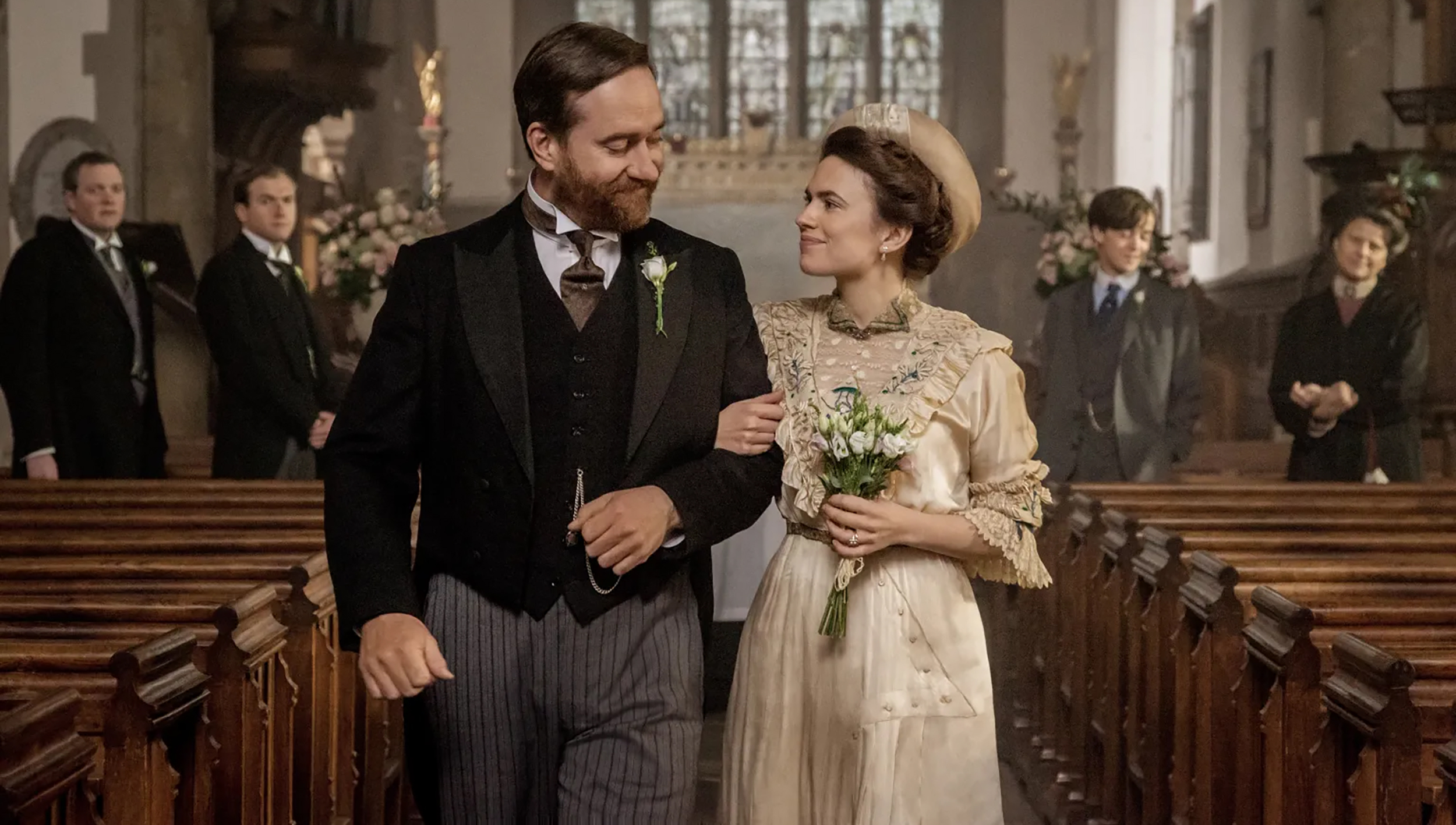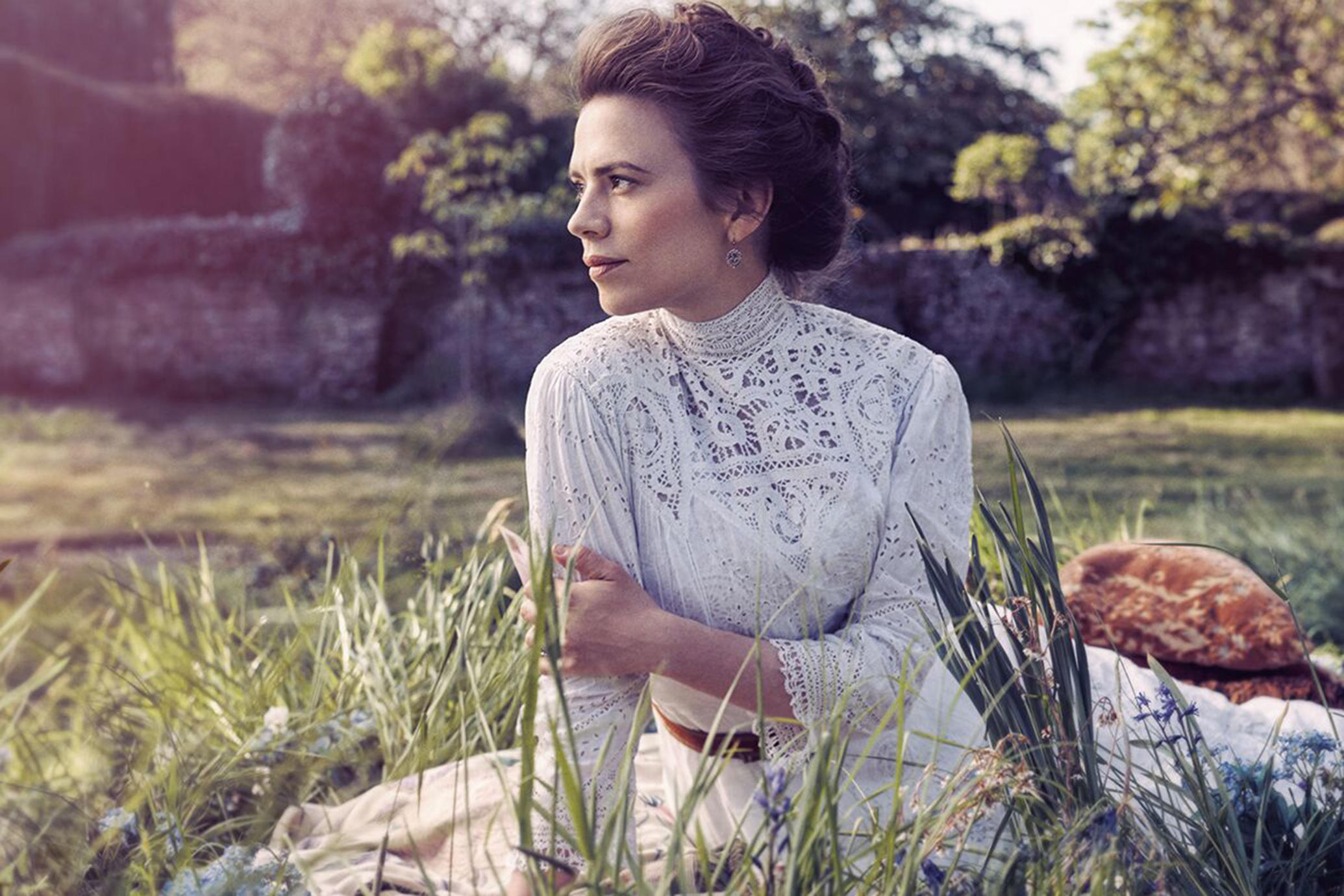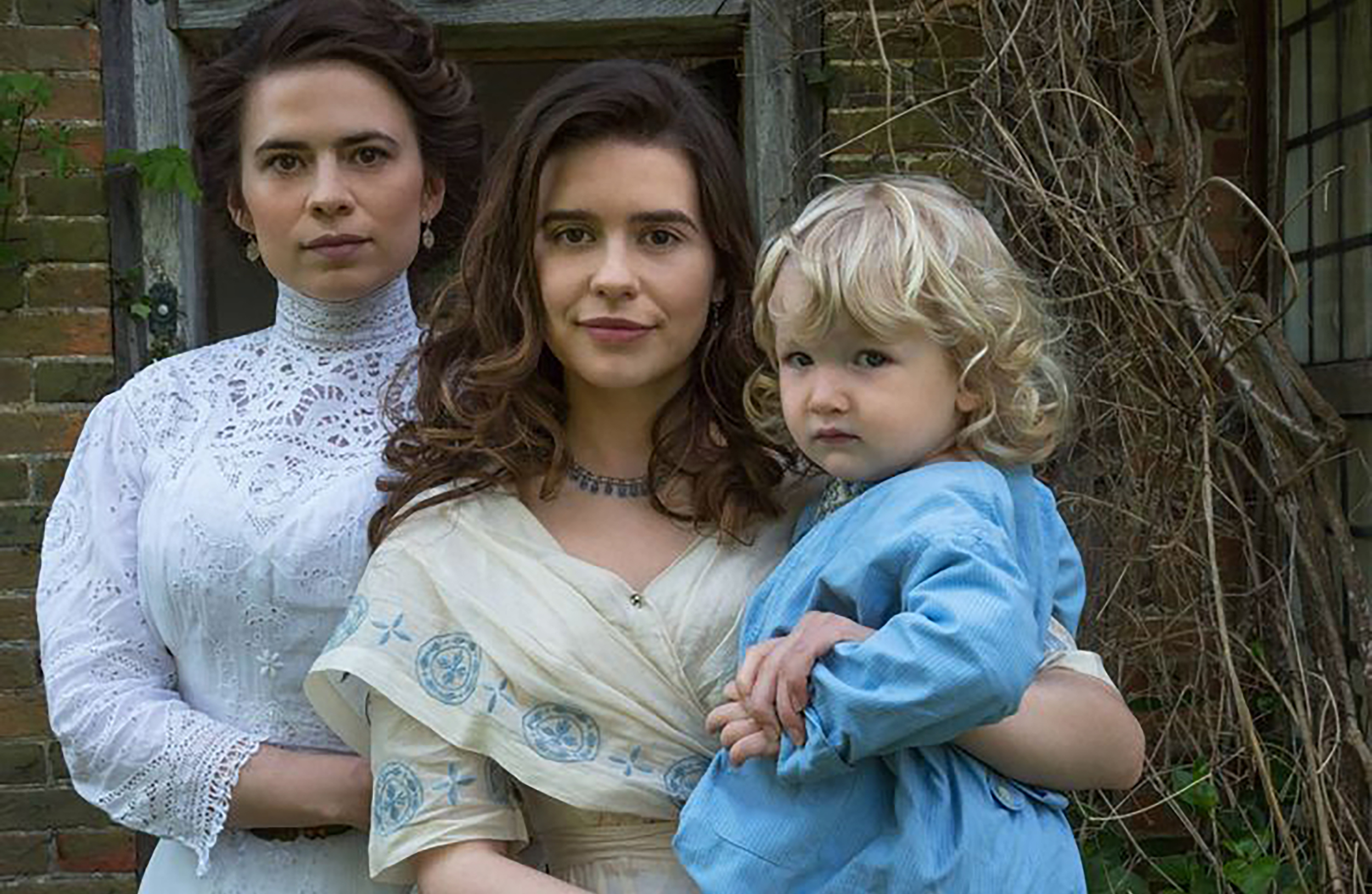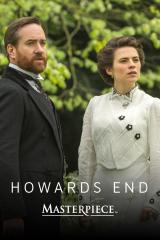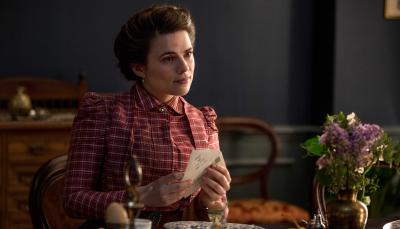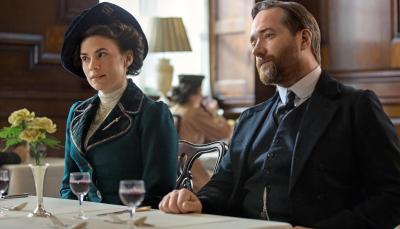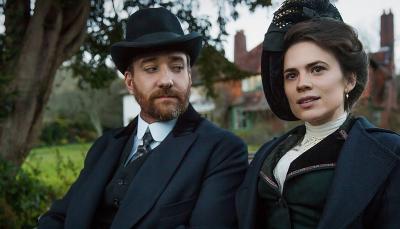A Happy Ending (of Sorts) at 'Howards End'
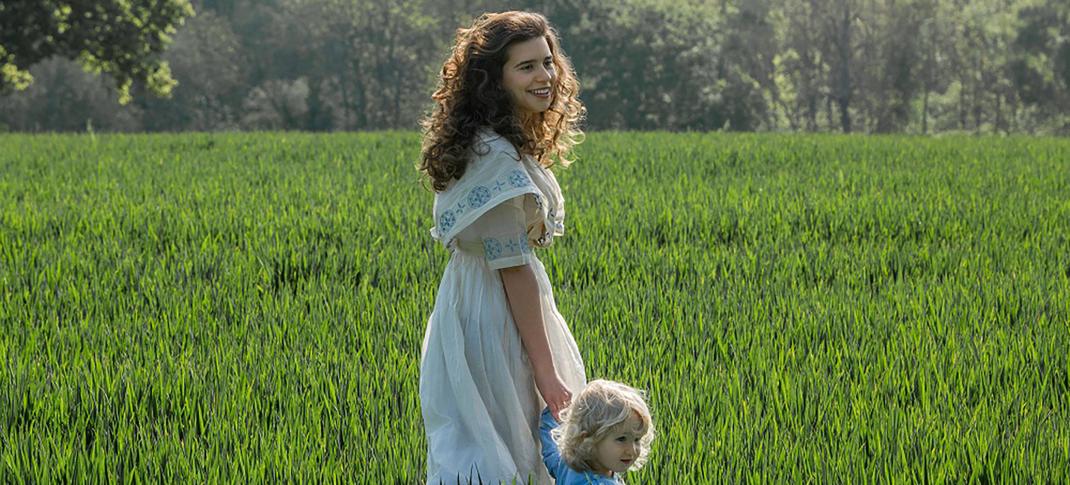
Philippa Coulthard as Helen in 'Howard's End'
@2017 Starz
Still reeling over the all-points collision of the Schlegels, the Wilcoxes, and the Basts in Howards End? Brace yourself; there’s more coming in the finale, along with some melodrama, coincidences, toxic masculinity, and inexplicable decisions. (In other words, business as usual.) We last saw Margaret writing a letter, which turns out was to Henry. Surprisingly, she tears it up and, even more surprisingly, writes to Leonard Bast, telling him she can offer no more assistance. She has decided to throw her lot in with Henry, all or nothing, and informs him that they are still engaged. Henry tries to explain himself in a rare moment of vulnerability, and Margaret assures him he is forgiven.
Helen is not at the small wedding, which isn’t surprising since she is somewhere in Germany, evasive about where. Tibby is the only person who has seen her since she left after Edie’s wedding. He was home (teaching himself Chinese because, well, Tibby) when she arrived, deeply upset, announcing that she was leaving the country. She asked Tibby to arrange a check for £5,000 — a massive amount of money and half of her capital — to be sent to the Basts. (The check is returned.) Without Helen, the Wilcox’s Ducie Street house is a good fit for Tibby. All the Schlegels’ furniture and books go to Howards End. Again, Margaret walks through the rooms of an empty house, this time saying goodbye.
Dolly Wilcox, Charles' wife, visits Margaret, who’s looking over the plans for the new house she and Henry plan to build in Sussex. Dolly mentions that the charwoman, Miss Avery, has started to unpack the Schlegels’ belongings, including the books, which alarms Margaret. She's pretty sure Dolly’s visit was at her husband's request, who still believes the Schlegels are trying to steal Howards End. Margaret travels to the house, and we enter Rebecca territory, with Miss Avery as a Mrs. Danvers in reverse. Margaret is torn between delight at seeing her beloved possessions, including a family sword, and frustration at Miss Avery, who has her own opinions.
Aunt Juley falls gravely ill, and Margaret telegrams Helen, insisting she must come home. But Aunt Juley recovers, and Helen, using their bank’s address, writes that she wants some of her books. Margaret and Tibby request that she meet them at the bank, but they’re concerned enough to ask Henry for help when she doesn't show up. Making it clear that everyone must do as he says, Henry dictates a letter to Margaret in which she invites Helen to come to Howards End for her books. As they leave, Leonard Bast stands in the street, searching for the Schlegels. When he arrives at Ducie Street, the maid relays a message from Tibby that Margaret is at Howards End.
Meanwhile, Margaret, already uneasy that she is deceiving her sister, is made more so by Henry’s management of the meeting, which includes picking up a doctor on the drive to the house. Henry has made up his mind that Helen is mentally ill. Margaret fumes, and when they arrive at Howards End, she runs ahead to meet her sister at the door. Helen is noticeably pregnant, and Margaret hustles her back inside, then goes back to confront Henry. Margaret takes over the situation entirely, standing guard at the garden gate, blocking the way into the house.
Margaret informs Henry that Helen is pregnant; she will be the one to deal with it, not him. She has confidence and decisiveness equal to Henry's but uses them with her own intelligence and compassion. Although she's been somewhat naive previously, she has a terrific grasp on what Helen's future and that of her child will be without support and is fully conscious of the sexual politics at play here.
Margaret returns to Henry at Charles and Dolly’s house and tells him she intends to stay overnight at Howards End with Helen, who will return to Germany the next day. Henry, however, is most concerned that Helen has no visible husband and, therefore, cannot stay in his house. Why? Margaret asks. Would her condition depreciate the property? She becomes furious when Henry piously insists that he has his children and the memory of his late wife to consider and rages against his inconsistency and hypocrisy.
If Margaret fell in love with Howards End and Henry, it’s clear that the love of her life is her exasperating younger sister. Huddled together, they expect their tender, emotional reunion will be interrupted by irate members of the Wilcox family at any moment. Meanwhile, Charles goes blustering off to cross-question Tibby, who grows up a little. Heroically slumped in an armchair, he refuses to betray his sisters, firmly puts Charles in his place at the suggestion that he was implicit in Helen’s affair, and calls him out for being a bully. “What a family!” Charles shouts as he stomps out of the house, but unfortunately, he now knows enough to suspect Leonard Bast.
Astonishingly, Henry, who knows his son has violent tendencies (he has to remind him to restrain himself), sends him to get the two women out of Howards End at dawn, just as Leonard arrives. Bast enters the room and has one startled moment in which he realizes that Helen is pregnant before Charles attacks, announcing that he will give him a good thrashing. Charles grabs the Schlegel family sword that Miss Avery so carefully put on display as his weapon, and the two blunder around the room, amidst shouting, screaming, and general chaos. A bookcase is knocked over. It falls on top of Leonard.
(Yes, he is killed by a falling bookcase. Take a moment to absorb the symbolism.)
When Margaret meets Henry again in Charles and Dolly’s garden, some time has passed. She flings the keys to Howards End at Henry, announcing she and her sister are leaving for Germany and will live there. But she hasn’t thought through the implications of Leonard’s death. The inquest revealed that Bast had heart disease, which would have shortly killed him, but that does not clear Charles. Almost certainly, he is to be tried for manslaughter and imprisoned, and even with his considerable power and influence, Henry cannot save him. He turns away from Margaret, weeping. Her eyes are well up, but she doesn’t move or speak to comfort him significantly.
At this point, the episode has about ten minutes to wrap everything up, so it’s not surprising to find Margaret, Helen, and a toddler sitting in the garden at Howards End. Two years have passed, and inside the house, there’s a Wilcox family conference, to which they are shortly invited. Youngest son Paul, with whom Helen had a brief, embarrassing affair in Episode 1, is back from Africa, sporting a mustache to prove that he’s All Grown Up. The family has decided that the house should be given to Margaret, and Dolly remarks that it’s just as Ruth Wilcox intended.
Henry — a kinder, gentler version of himself — tells Margaret it’s an old story and that he'd checked the legality of the "gift," Ruth didn’t leave it to her. That’s not how I remember it, but everyone seems satisfied, and Margaret says he did nothing wrong. Margaret and Henry leave the house hand in hand and stroll across a lush green meadow, accompanied by Helen and her son.
This post was originally published January 2020. Updated 11.23.2024
All four episodes of the 2017 adaptation of Howards End are available to stream on the PBS app, PBS Masterpiece Prime Video Channel, and for members of PBS Passport.

